

By John Helmer, Moscow
@bears_with
Soldiers lay down smoke on the battlefield to conceal their movements, advancing or retreating, from the troops on the other side.
In the US Army manuals for warfighting with smoke, there are four kinds for the battlefield (lead image) – obscuring smoke which is aimed at blinding the enemy so he can’t see what you have coming for him; screening smoke which is laid down between you and your enemy, so he can’t see what you are doing in your positions; protecting smoke which is aimed at disrupting the laser and other targeting systems of the other side’s artillery and rockets; and marking smoke whose purpose is either to pinpoint targets for air attackers or rear artillery, or identify safety positions on a rapid-movement battlefield.
With the White House in the lead, in the war the NATO allies are fighting against Russia to the last Ukrainian, an entirely new kind of smoke has been used – it’s the blowback smoke which blinds its users. On the Ukrainian battlefield this smokescreen conceals nothing from the Russians. Instead, it is being used to deceive the NATO country media, voters, and parliaments which must agree to subscribe the money to pay the Ukrainians to fight, and supply them with NATO ammunition, weapons, intelligence, and support services, including credits and cash. Vladimir Zelensky, the Ukrainian president best known for career comic turns — the most famous of which was playing a piano with his penis (screened, protected, marked) — is the master of the blowback smoke on the present battlefield.
A day ago, he told the Ukrainian deputy prime minister of Canada, Chrystia Freeland: “we are approaching a moment when relevant actions can gain pace because we are already going through some mines locations and we are demining these areas.” The calculated ambiguities – “moment”, “approaching”, “relevant”, “can”, “pace”, “some” – are the smoke. The blowback was started by Freeland who told Zelensky that how his counteroffensive was going against the Russians is “the question in the minds of everyone here [and] the preoccupation of all of your friends in the world”. Zelensky’s smoke was invited by Freeland to blind the world, especially their friends.
In this week’s War of the Worlds discussion with Swiss Army Colonel Jacques Baud, this tactic is exposed, and in its place evidence revealed of the French and other allied general staffs trying to find their way off the battlefield, as Zelensky forces are destroyed, along with the best of US, French, British and other NATO weapons. The programme was pre-recorded on Thursday.
Less than twenty-four hours later at a virtual session of the Russian Security Council, President Vladimir Putin made an unusual introduction to the closed-door plans of his military, security and intelligence chiefs. “It is clear today,” Putin said, referring to the Americans, French, Germans, and British, “that the Western curators of the Kiev regime are certainly disappointed with the results of the counteroffensive that the current Ukrainian authorities announced in previous months. There are no results, at least for now.”
“The whole world sees that the vaunted Western, supposedly invulnerable, military equipment is on fire, and is often even inferior to some of the Soviet-made weapons in terms of its tactical and technical characteristics.”
Then on the topic of Poland and Galicia, Putin makes the most important statement by a Russian leader in more than a hundred years. Putin warns the Polish government, together with the Lithuanians, not to make a troop move on Galicia’s capital Lvov, as the Germans had done in 1941. He also warns Berlin not to imagine they can recover the old Prussian or the more recent Third Reich sway in those territories.
Between the lines also, Putin issued an invitation to two of the ruling factions in Kiev – the military command and the Lvov Banderites – that they should remove Zelensky quickly, before they lose what will be left of their territory, after the Russian Army goes on the offensive. If they want to keep Galicia, “this, I repeat”, Putin said, “is in the end their business. If they want to relinquish or sell off something in order to pay their bosses, as traitors usually do, that’s their business. We will not interfere in this.”
Putin’s smoke signal carried a subliminal meaning. He didn’t identify the Biden administration. Instead, he implied that Zelensky is the Americans’ underboss; and that if the Ukrainians want to survive the war in which everything made in America is “on fire”, the Ukrainians don’t have long.
Colonel Jacques Baud returns from the first discussion on air on July 15. For elaboration and analysis of that interview, read this.
Listen to the new discussion here:
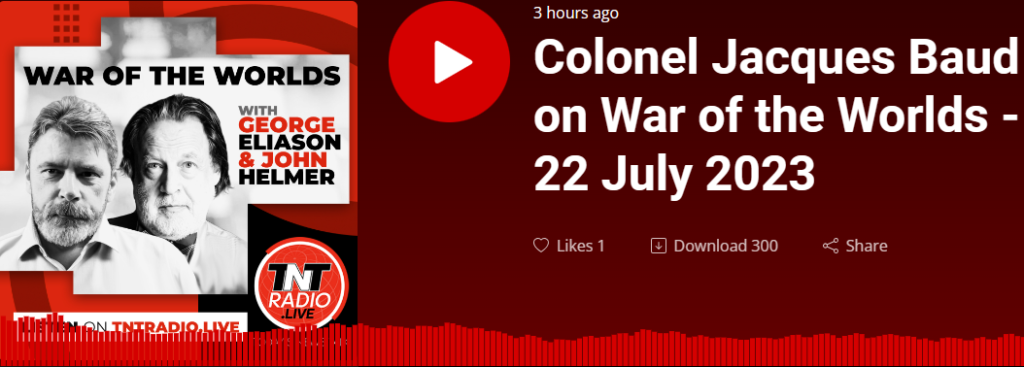
Source: https://tntradiolive.podbean.com/
The Battle of Odessa has begun, Baud says. But Russian strategy for the major cities remaining east of the Dnieper River which will be Russian at war’s end does not involve city siege or urban fighting, like Mariupol, he adds, citing Robert Mardini, the Swiss director of the International Red Cross.
Russian war correspondents reporting on the opening missile barrages against Odessa last week confirm this targeting. When a grain storage terminal was hit, Boris Rozhin (“Colonel Cassad”) reported “an important detail, despite all the tantrums in Ukraine and [NATO], even according to official Ukrainian data, there are no civilian deaths. Despite the large number of incoming. This indicates the high accuracy of the strikes and once again shows that the Russian Federation does not purposefully strike at the civilian population. Unlike the Ukraine.”
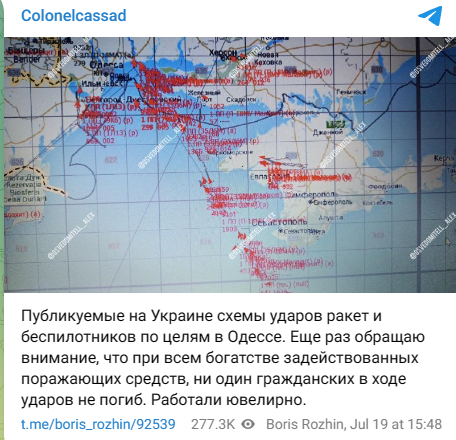
“Map of missile and drone strikes against targets in Odessa as published in Ukraine. Once again, I would like to draw your attention to the fact that with all the wealth of destructive means involved, not a single civilian was killed during the strikes. They operated like clockwork.” https://t.me/boris_rozhin/92539
To understand the impact of the electric war on the Odessans, and the way the Stavka in Moscow is calculating the city will switch sides as soon as the Kiev regime’s control is broken, read this.
From the northern front, where Russian and Belarus forces are creating the concentration, or the smokescreen for potential offensives aimed at Chernigov, Suny, Poltava, and Kiev, comes the news from the new Wagner camp at Tsel, Belarus. An old military base which has been revived, it is about 100 kilometres southeast of Minsk; about 200 kms northwest of Chernigov and the Ukrainian border.

Source: https://www.bbc.com/
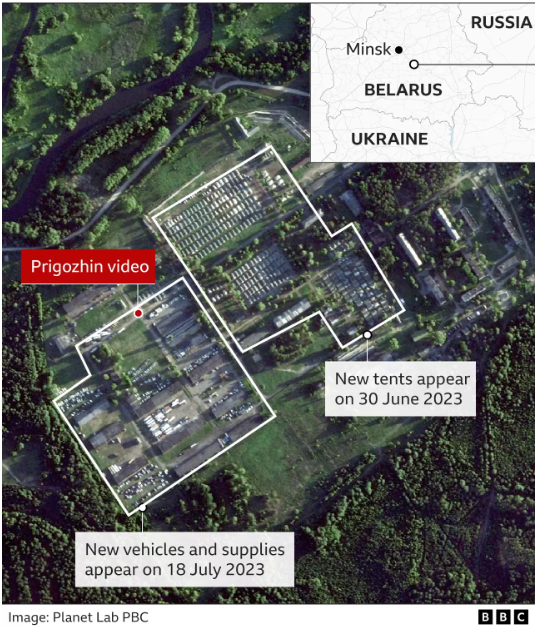
Source: https://www.bbc.com/
A video clip has been published on the internet in which the soundtrack reveals the unseen Yevgeny Prigozhin speaking to a group of Wagner soldiers; the location appears to be the new Tsel camp. The film also marks the first public appearance, also unseen, of Dmitry Utkin, the military commander of Wagner; from the applause which greeted his remarks, he is a more popular figure among the troops than Prigozhin. Listen to the recording here, If blocked in some areas, this is an English-language version.
“If anyone doesn’t know,” Utkin can be heard introducing himself in Russian. “I am the Wagner. Many thanks to everyone for the work done, thanks to this work, the name PMC [private military company] Wagner has thundered all over the world. This is not the end, but only the beginning! The biggest work in the world that will be done very soon! [In English] Welcome to hell!”
More guarded as double-talk goes was the joint press conference at the Pentagon on July 18. In their remarks Austin and Milley were beating a US retreat.

Left to right: Lieutenant-Colonel Dmitry Utkin; Defense Secretary General Lloyd Austin; JCS Chairman General Mark Milley.
Asked to respond to Ben Wallace, the British defense minister and the first NATO official of active rank to reveal publicly the allies’ doubt towards Zelensky and his regime, Austin was asked by a reporter: “Secretary Austin, you talked about the alliance and the contact group being together. But publicly, there seems to be a bit of fraying. Defense Minister Wallace last week said that he had told his Ukrainian counterparts that, quote/unquote, ‘We are not Amazon, and that they should show us some appreciation.’ Do you agree with the sentiments that Secretary Wallace expressed?”
Austin stumbled in reply: “You know, we’re just off of — just back from the summit in Vilnius, and what I witnessed in Vilnius was indeed unity and cohesion, in every meeting that I sat in. And so I would — it’s the same thing that I witnessed today as I talked to ministers of defense and chiefs of defense. That unity is still there. There’s no question that we have provided Ukraine a lot, we, the international coalition. Ukraine is in a fight, and we have to remember that, when you’re in a fight, you want everything that you can get your hands on. And so that’s to be expected. Ben Wallace and I have worked along with coalition partners over the last year or so on this particular issue, and Ben has done a lot to enable and to help the Ukrainian military. And so he’s been a great partner. But, again, I continue to see unity and cohesion. I continue to hear ministers say that we’re going to support Ukraine for as long as it takes.”
Austin was camouflaging the opposite of what he was trying to say. General Milley then let slip the loss of NATO confidence in the battlefield performance of US and NATO weapons and the Ukrainian army. “So Missy, the — I’d offer two things. One is, you know, what’s the military problem to solve here with the air power? And it’s control of the airspace, and you can do that two ways. You can do that air-to-air or you can do that from the ground to the air. In terms of the most effective and efficient and cost-effective way to do that right now for the Ukrainians is from ground to air through air defense systems, and that’s what they’ve been provided from the beginning if this war ’til now. And that’s important, because what you want to do is protect those assault forces from Russian close-air support and/or attack-helicopter support, and they’ve got air defense systems, the Ru- — Ukrainians do, that can do that.”
Milley almost admitted the truth. It has been the “Ru[ssians]”, not the “Ukrainians” who have demonstrated their superiority in countering and destroying every NATO air defence weapon on the battlefield and around the cities – the most important of which is the US-made Patriot.
“The casualties that the Ukrainians are suffering on this offensive are not so much from Russian airpower; they’re from minefields, minefields that are covered with direct fire from anti-tank hunter-killer teams, that sort of thing. So it’s minefields. So the problem to solve is minefields, not the air piece right this minute. And that’s what the coalition is trying to provide them: additional mine clearing, MICLICs, line charges, Bangalores — that sort of thing, in order to continue to work their way through the minefields.” This was Milley introducing the US decision not to supply F-16 fighter-bombers to the Ukraine.
“So I’m confident that they can do this, and especially if they execute the tactics, techniques and procedures that they’ve been taught, which they are doing, and execute these operations at night, which would deny the Russians the ability to use any of their airpower anyway. So the real problem is the minefields. It’s not right now the airpower. Now, having said that, just do a quick math drill here. Ten F-16s are $2 billion, so the Russians have hundreds of fourth- and fifth-generation airframes. So if they’re going to try to match the Russians one for one, or even, you know, two-to-one, you’re talking about a large number of aircraft. That’s going to take years to train the pilots, years to do the maintenance and sustainment, years to generate that degree of financial support to do that. You’re talking way more billions of dollars than has already been generated.”
“So the key thing is to focus on air defence, focus on the blocking-and-tackling sort of offensive combined arms maneuver, which is artillery, as both long-range and short-range artillery, and then get in your engineers and your mine-breaching equipment. That’s the kind of stuff they need. That’s what they want. That’s what they’re asking for. When I talk to [Ukrainian chief of the general staff, General Valery] Zaluzhny, that’s what he’s asking for, so”.
Milley is also revealing that for the Joint Chiefs of Staff, General Zaluzhny is in line, not President Zelensky.
The new US and NATO decision not to allow the deployment of the F-16s in the war has followed the declaration on July 12 by Russian Foreign Minister Sergei Lavrov that the aircraft is a nuclear-capable attacker and would be treated as such. Milley was ambiguous in his retreat, but three days later, on July 21, the National Security Advisor Jacob Sullivan was categorical. “Ukrainian emphasis on securing supplies of advanced fighter jets for the counteroffensive was misplaced, because strong Ukrainian and Russian air defences had prevented air power from playing a significant role in the conflict, Sullivan said. ‘The view of our military commanders is that the notion that F-16s would play a decisive role in this counteroffensive given that fundamental reality . . . They have a different view than what you have heard from some Ukrainian voices,’ he said.”
The Russian warning to Warsaw on Galicia beat the Poles to the punch, and to the retreat. On Friday afternoon, Warsaw time, the former prime minister Beata Szydlo issued the bluntest statement yet against the Kiev leadership.
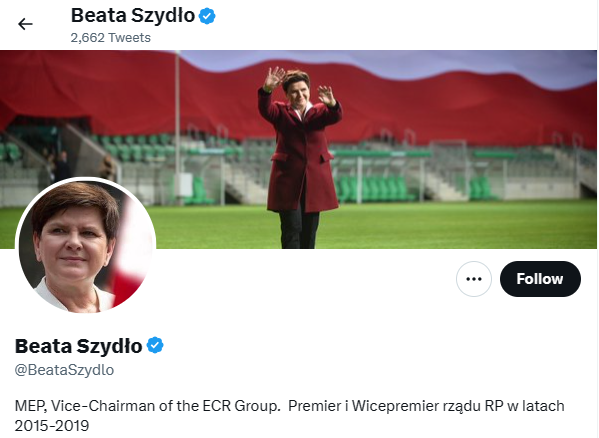
Source: https://twitter.com/BeataSzydlo
“The statement of the Prime Minister of Ukraine Denys Shmyhal,” Szydlo said in a tweet published in both Polish and English, “is simply unfair to Poland. After all, such an experienced politician as the head of the Ukrainian government must understand how much Poland has done to help Ukraine, rescuing the country at the moment of greatest danger. Mr. Prime Minister Denys Shmyhal also knows that Ukraine was supposed to transit its agricultural products to third countries through Poland. Meanwhile, Ukrainian producers of grain and other foodstuffs – mark you, large corporations owned by oligarchs, not farmers – decided to seize the opportunity and flood Poland with their products. Such behavior has nothing to do with friendship and cooperation. In fact, the Prime Minister of Ukraine should apologize to Poland for unfair practices, rather than making theses that harm Poland and Polish-Ukrainian relations. For the government of the Law and Justice Party [PiS], the most important thing is the welfare of Polish citizens and the Polish economy, including agriculture. The Polish market must and will be protected from unfair practices”. For more detail on the Polish and European Union embargo on Ukrainian grain exports and the UN scheme for Kiev’s grain profiteering, read this.
The Kremlin posted Putin’s speech to the Poles at 13:05 Moscow, 12:05 Warsaw. The Russian president had spoken several hours before the Polish ex-prime minister and head of the Polish delegation in the European Parliament broke cover. “Have our friends in Warsaw forgotten,” Putin said. “We will remind you.”
“Now the fire of war is being strenuously kindled. In particular, they use for this the ambitions of the leaders of some Eastern European states, who have long turned hatred of Russia, Russophobia, into their main export commodity and into an instrument of their domestic policy. And now they want to warm their hands on the Ukrainian tragedy. In this regard, I cannot but comment on what has just been said: and the reports that have appeared in the press about plans to create a certain so-called Polish-Lithuanian-Ukrainian connection.”
“That is, we are not talking about some gathering of mercenaries — there are enough of them already there, and they are being destroyed – namely, about a regular, assembled, equipped military unit that is planned to be used for operations on the territory of Ukraine. Including for allegedly ensuring the security of modern Western Ukraine, and in fact, to call a spade a spade, for the subsequent occupation of these territories. After all, the prospect is obvious: if Polish units enter, for example, Lvov or other territories of Ukraine, then they will remain there. And they will remain forever.”
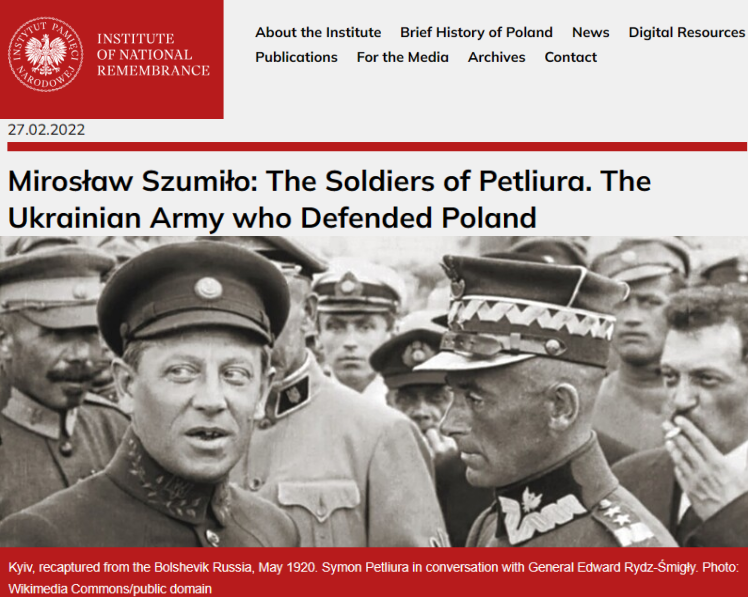
Source: https://ipn.gov.pl/
This is the official Polish version of the history, issued three days after the commencement of the Russian Special Military Operation. In Putin’s version, “They [the Zelensky regime] will trade everything: both people and land. Just, by the way, like their ideological predecessors, the Petliurists, who in 1920 concluded so–called secret conventions with Poland, according to which, in exchange for military support, they gave Poland the lands of Galicia and Western Volhynia. Even today, such traitors are ready to open the gates for foreign owners and once again sell Ukraine. As for the Polish leaders, they probably expect to form a coalition under the NATO umbrella and directly intervene in the conflict in Ukraine in order to then tear off a fatter piece for themselves, to regain, as they believe, their historical territories – today's Western Ukraine. It is well known that they also dream of Belarusian lands.”
“By the way,” Putin responded with the Russian history, “there will be nothing new. Let me remind you that after the defeat of Germany and its allies, following the results of the First World War, Polish units occupied Lvov and the adjacent lands that then belonged to Austria-Hungary. Poland, instigated by the West, also took advantage of the tragedy of the Civil War in Russia, annexed some historical Russian provinces. Our country, which was then in a difficult situation, was forced to conclude the Riga Treaty in 1921 and actually recognis the rejection of its territories. And even earlier, in 1920, Poland seized part of Lithuania – the Vilna Region, the territory around modern Vilnius. It seems that together with the Lithuanians they fought against the so-called ‘Russian imperialism’ and as soon as the opportunity turned up, they immediately cut off a piece of land from their neighbours. Poland, as you know, also participated in the partition of Czechoslovakia as a result of the Munich agreement with Hitler in 1938. Completely occupied Tesin Silesia.”
“In the 20-30s of the last century, in the so-called Eastern Districts of Poland – and this is the territory of Western Ukraine, Western Belarus and part of Lithuania – there was a strict polonization and assimilation of local residents; there was a suppression of national cultures, Orthodoxy. I would also like to remind you how such an aggressive policy ended for Poland as a result. It ended with the national tragedy of 1939, when Poland was thrown by the Western Allies to the German war machine and actually lost its independence and statehood, which was restored to a great extent thanks to the Soviet Union. And it was thanks to the Soviet Union, thanks to Stalin’s position, that Poland received significant lands in the West, the lands of Germany. This is exactly the case: the western territories of present–day Poland are Stalin’s gift to the Poles.”
What Stalin gave away, Putin was saying, the Russian Army is prepared to take back – unless Zelensky and the Americans are removed.
Moscow sources express their surprise that the Anglo-American media have failed to report Putin’s remarks and appreciate their significance. “Are the British and Americans all at the beach?” asked one of the sources familiar with the matter. “More likely they realise the game is up for Zelensky. Maybe they are advising him to plan a fake coup to cover his escape, and promising to have the aircraft warmed up in Poland to take him out.”











Leave a Reply